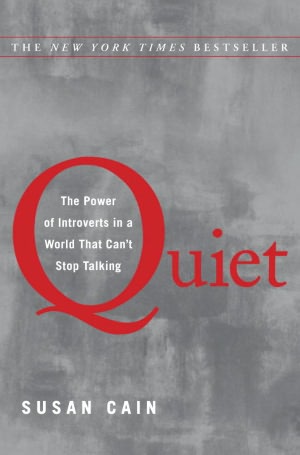 I’ve always considered myself an extrovert. I love travel, people, and I’m an incurable optimist. I’m generally loud and outspoken and public speaking is a thrilling challenge. As I began to read Susan Cain’s Quiet: The Power of Introverts in a World that Can’t Stop Talking, I wondered whether I would find it truly engaging to read of a personality style so foreign to my own. After all, introverts are boring and antisocial, right?
I’ve always considered myself an extrovert. I love travel, people, and I’m an incurable optimist. I’m generally loud and outspoken and public speaking is a thrilling challenge. As I began to read Susan Cain’s Quiet: The Power of Introverts in a World that Can’t Stop Talking, I wondered whether I would find it truly engaging to read of a personality style so foreign to my own. After all, introverts are boring and antisocial, right?
Wrong.
Mere pages in, I began to realize how much I actually have in common with this oft-stereotyped trait. As a kid, I was the studious, science-loving type and fancied a good book to a play date. I still do. I get a high from the beauty found in nature, relish quiet walks, and prefer email to phone calls with strangers. I like parties, but more often than not feel a stronger need to just recharge with family and close friends. All tell-tale signs of introversion.
While Cain’s work enlightened my view of my own personality, it illuminated the truth about introverts. Cain introduces us to highly revered figures—Bill Gates, Eleanor Roosevelt, and Albert Einstein, among others—who have benefited from the introspective and cerebral qualities of introversion. Contrary to the American Extroversion Ideal, without such quiet thinkers we may have never seen the likes of the personal computer, the New Deal, or e=mc². Cain draws us along on her journey, from the gregarious auspices of Harvard and pseudo-religious Tony Robbins seminars, to tranquil hideaways and studious Cupertino, California, as she asks us to rethink our perceptions of successful acclimation and groupthink business practices.
Quiet is a whirlwind tour of the social sciences—ancient philosophies and Sigmund Freud, the interactions of corporate America, mammalian biology, and the dark depths of fMRI machines. We discover “orchid children,” those delicate hothouse flowers of youth that thrive in supportive families but may wither if not properly nourished. We learn how introverts must struggle at times to have their voices heard, and how extroverts would do well to learn from quiet dispositions. We observe cultural variations in outgoingness and the “soft power” therein.
But I still had to know—was I the extrovert as I had always held, or had I masked my true self all these years? A quick Myers Briggs personality inventory revealed that I’m actually an ambivert—right in the middle of the introversion-extroversion spectrum. Even here on the fringes of introversion, I’m in good company.
Cain, a “consummate introvert” herself, spins an entertaining, intriguing, and uplifting account of the human spirit. Quiet is a celebration in undertones of the subdued and understated value of the soft-spoken loner concealing genius within.
Cara Carroll is a psychology major and aspiring writer at Austin Peay State University. She has an affinity for the sciences, young adult fiction, and children’s books. She maintains a blog about healthy living.
